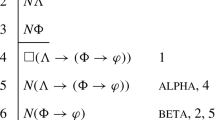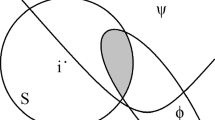Abstract
The semantics for counterfactuals due to David Lewis has been challenged by appealing to miracles. Miracles may skew a given similarity order in favour of those possible worlds which exhibit them. Lewis responded with a system of priorities that mitigates the significance of miracles when constructing similarity relations. We propose a prioritised ceteris paribus analysis of counterfactuals inspired by Lewis’ system of priorities. By analysing the couterfactuals with a ceteris paribus clause one forces out, in a natural manner, those possible worlds which do not satisfy the requirements of the clause, thus excluding miracles. If no world can satisfy the ceteris paribus clause in its entirety, then prioritisation is triggered to select worlds that maximise agreement on those things which are favoured most.
Similar content being viewed by others
Notes
See Schurz (2002) on comparative ceteris paribus laws.
The choice of \(\varGamma \) finite is largely technical. We will mention some possibilities and difficulties regarding the case where the ceteris paribus set \(\varGamma \) may be infinite in Sect. 7.
We redefine the language more precisely as Definition 6 in the appendix, particularly avoiding non-well-founded sets \(\varGamma \). For simplicity we work with the one now stated.
Though the set \(\mathsf {Prop}\setminus (\mathsf {UD}(\varphi ) \cup \mathsf {UD}(\psi ))\) is an infinite set when \(\mathsf {Prop}\) is, it is not as ambitious as the previous infinite sets we’ve considered, because it is a co-finite set. Co-finite sets are a special cases of flexible sets as defined and axiomatised in Seligman and Girard (2011). To keep focus, we will stick with finite \(\mathsf {CP}\)-sets in this paper, and leave an exploration of the flexibility approach to infinite sets in conditional logic for future research.
It could be that neither \(A_\varGamma ^\mathcal {M}(v,w) \unlhd A_\varGamma ^\mathcal {M}(u,w)\) nor \(A_\varGamma ^\mathcal {M}(u,w) \unlhd A_\varGamma ^\mathcal {M}(v,w)\), as \(\unlhd \) is a preorder.
We provide an example of a prioritisation order that allows for incomparability in Sect. 5.2.2.
In \([\varphi ,\varGamma ,\le ]\), we use \(\le \) instead of \(\unlhd \) to indicate that the modality is based on the specific ceteris prioritisation given by naïve counting. We will use notation in a similar fashion below.
References
Bennett, J. (1974). Review of Lewis (1973). The Canadian Journal of Philosophy, 4, 381–402.
Blackburn, P., de Rijke, M., & Venema, Y. (2001). Modal logic. New York: Cambridge University Press.
Dalal, M. (1988). Investigations into a theory of knowledge base revision: preliminary report. Proceedings of the Seventh National Conference on Artificial Intelligence, 2, 475–479.
del Cerro, L. F., & Herzig, A. (1994). Interference logic = conditional logic + frame axiom. International Journal of Intelligent Systems, 9(1), 119–130.
del Cerro, L. F., & Herzig, A. (1996). Belief change and dependence. In Proceedings of the 6th conference on Theoretical aspects of rationality and knowledge (pp. 147–161). Morgan Kaufmann Publishers Inc.
Doyle, J., & Wellman, M. P. (1994). Representing preferences as ceteris paribus comparatives. Ann Arbor, 1001, 48109–482110.
Elga, A. (2001). Statistical mechanics and the asymmetry of counterfactual dependence. Philosophy of Science, 68(3), S313–S324.
Fine, K. (1975). Review of Lewis’ counterfactuals. Mind, 84, 451–458.
Girard, P., Triplett, M.A. (2015). Ceteris paribus logic in counterfactual reasoning. In Proceedings of TARK XV.
Hendricks, V. F. (2006). Mainstream and formal epistemology. Cambridge: Cambridge University Press.
Holliday, W.H. (2014). Epistemic closure and epistemic logic I: Relevant alternatives and subjunctivism. Journal of Philosophical Logic, 44(1), 1–62.
Katsuno, H., & Mendelzon, A. O. (1991). Propositional knowledge base revision and minimal change. Artificial Intelligence, 52(3), 263–294.
Lee Bowie, G. (1979). The similarity approach to counterfactuals: Some problems. Noûs, 13(4), 477–498.
Lewis, D. (1973). Counterfactuals. Cambridge: Harvard University Press.
Lewis, D. (1979). Counterfactual dependence and time’s arrow. Noûs, 13(4), 455–476.
McCall, S. (1984). Counterfactuals based on real possible worlds. Noûs, 18(3), 463.
Priest, G. (2008). An introduction to non-classical logic: From if to is. Cambridge: Cambridge University Press.
Proietti, C. (2009). Ceteris paribus modalities and the future contingents problem. Logics for Dynamics of Information and Preferences., 173(1), 304–325.
Proietti, C., & Sandu, G. (2010). Fitch’s paradox and ceteris paribus modalities. Synthese, 173(1), 75–87.
Schaffer, J. (2004). Counterfactuals, causal independence and conceptual circularity. Analysis, 64(284), 299–308.
Schurz, G. (2002). Ceteris paribus laws: Classification and deconstruction. Erkenntnis (1975-), 57(3), 351–372.
Seligman, J., & Girard, P. (2011). Flexibility in ceteris paribus reasoning. The Australasian Journal of Logic, 10(0), 67–99.
Tooley, M. (2003). The Stalnaker-Lewis approach to counterfactuals. The Journal of philosophy, 100(7), 371–377.
van Benthem, J., Girard, P., & Roy, O. (2009). Everything else being equal: A modal logic for ceteris paribus preferences. Journal of Philosophical Logic, 38(1), 83–125.
von Wright, G. H. (1963). The logic of preference. Edinburgh: Edinburgh University Press.
Wasserman, R. (2006). The future similarity objection revisited. Synthese, 150(1), 57–67.
Acknowledgements
We wish to thank the participants at the Australasian Association of Logic and the Analysis, Randomness and Applications meetings held in New Zealand in 2014. A preliminary version of this paper was presented at TARK XV and we wish to thank the participants for helpful suggestions on improving the paper. We also wish to thank Sam Baron, Andrew Withy, Balder ten Cate and the anonymous referees for valuable comments.
Author information
Authors and Affiliations
Corresponding author
Rights and permissions
About this article
Cite this article
Girard, P., Triplett, M.A. Prioritised ceteris paribus logic for counterfactual reasoning. Synthese 195, 1681–1703 (2018). https://doi.org/10.1007/s11229-016-1296-5
Received:
Accepted:
Published:
Issue Date:
DOI: https://doi.org/10.1007/s11229-016-1296-5




